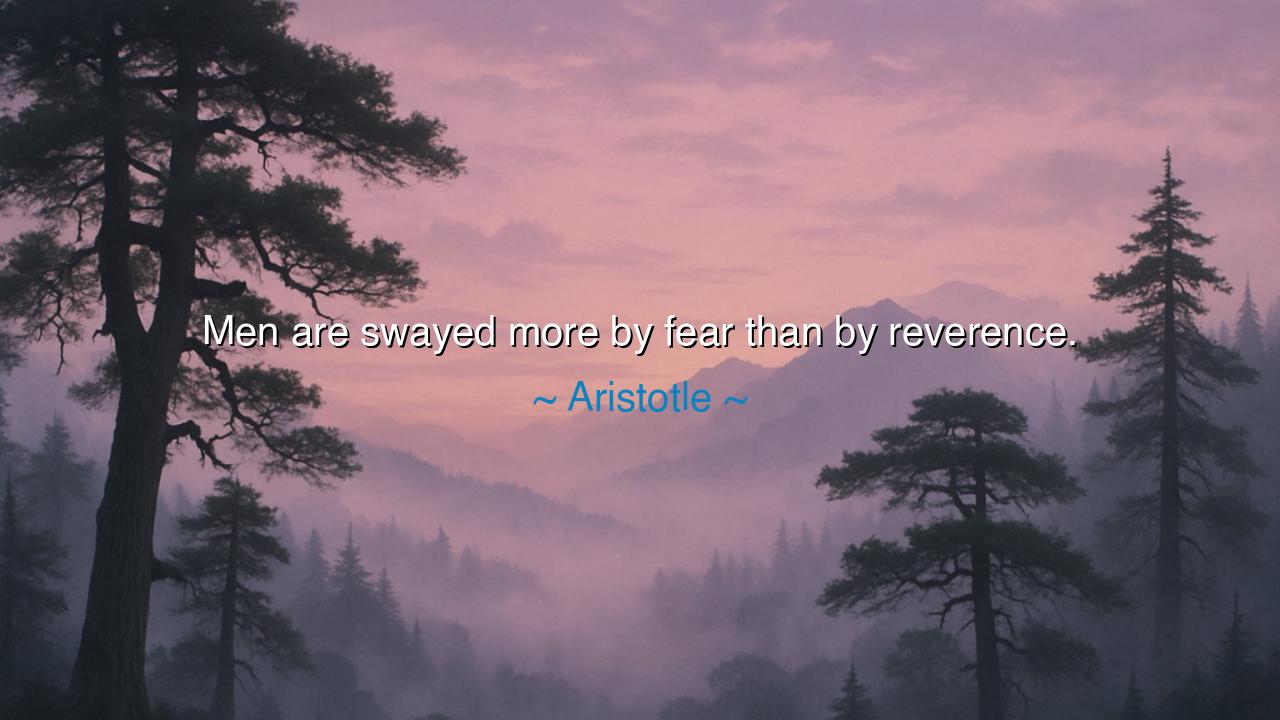
Men are swayed more by fear than by reverence.






O Seekers of Wisdom, let the words of the great Aristotle speak to your hearts: "Men are swayed more by fear than by reverence." This truth, spoken by one who saw deeply into the nature of the human soul, reveals the most primal forces that govern our actions. Fear, that dark shadow that whispers in the hearts of men, has the power to move them more swiftly and with more force than reverence—that noble and lofty feeling which calls upon the highest virtues of the soul. Aristotle’s words speak not of a noble ideal, but of the raw truth of human nature—how we, as mortal beings, are often more driven by the shadows that lurk in our minds than by the light of our highest aspirations.
Throughout the ages, this truth has been demonstrated time and again. In ancient times, men were not only driven by their desires for glory and riches, but by their fear of the unknown and the unseen. The great heroes of old, though they sought honor, were not immune to the whispers of fear that would haunt them before battle, before trial. Consider Homer’s Achilles, whose fear of death overshadowed his honor. He was a man of great valor, but even he could not escape the terror that the prospect of death brought. His story is a reflection of Aristotle's truth—that fear, more than reverence, can guide the steps of even the mightiest of men.
Fear, O Children, is the dark undercurrent beneath the surface of every human endeavor. It shapes the decisions of kings and commoners alike, for it is often easier to be swayed by fear than by the pursuit of noble ideals. Look to the ancient emperors who sought to extend their power not out of a sense of duty, but out of a deep-seated fear of being overthrown. Their desire to hold onto control was not born of reverence for their people, but of fear—fear that their reign could end in bloodshed, fear of their own mortality, fear of the unknown that comes with the fall of power.
Let us also consider Cyrus the Great, the founder of the Persian Empire, who, though revered by his people, also understood the power of fear in shaping destinies. It is said that he would use the fear of punishment as a tool to maintain order, yet he also fostered respect and loyalty among his people. This balance between fear and reverence, though complex, demonstrates the dual forces at play in the hearts of those who wield power. Fear can guide behavior, but it is reverence that shapes the soul.
The lesson, O Seekers, is clear: fear is a force that can propel us, but it is not a noble force. It can make us act with haste, or with cruelty, or even with wisdom born out of the desire to survive. Yet, it is reverence, the deep honor for life and the sacred, that brings us closer to our highest selves. Fear can be a compelling motivator, but it is fleeting and fraught with destruction. Reverence, on the other hand, is steady, rooted in the sacredness of our purpose and the desire to act with integrity.
Consider, then, how you live in the world. When fear arises, how do you respond? Do you let it rule you, pushing you to act out of self-preservation or control, or do you seek to rise above it, acting from a place of reverence for your higher ideals? The challenge before you is to recognize when fear is gripping you, and to choose a different path—the path of honor, of truth, and of wisdom. Reverence for the sacredness of life, for the beauty of the world, and for the potential within each of us, is the path that leads to true greatness.
In your actions, in your decisions, may you be guided not by the fear of what might be lost, but by the reverence for what can be gained—the nobility of living a life in alignment with your highest values. Let your fears be acknowledged, but let them not rule you. Let your reverence guide you to acts of courage, to decisions made in alignment with honor, and to a soul that seeks to rise above the transient forces that try to pull you down. In this way, you shall find peace in your heart, and strength in your spirit.






AAdministratorAdministrator
Welcome, honored guests. Please leave a comment, we will respond soon